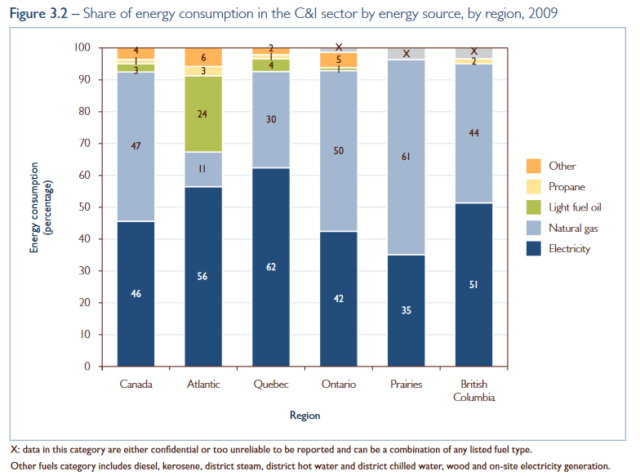The Future of Energy: Green or Hydrocarbon
There is little doubt the debate over renewable energy vs fossil fuels will not be won in the next few years, and possibly not in the next decade. What seems to be a conservative vs liberal argument has been going on for nearly 20 years, ever since many scientists raised the alarm about rising global temperatures and sea levels.
To begin with, renewable energy comes from natural resources that can be replaced in a person’s lifetime, whereas fossil fuels are believed to take thousands to even millions of years before they can be produced.
For some people, it would make complete sense for Canada and the US to just turn to more wind, solar and renewable sources of energy, but its not quite that simple. The Canadian dollar relies heavily on the price of oil (even though it only represents 18% of our exports), and as the 4th largest exporter of oil in the world, if the demand from the US was all-of-a-sudden cut off (97% of Canada’s oil goes to the US – 20% total world consumption)* it would have a catastrophic effect on the Canadian economy, jobs and housing. As a result, the price of the Canadian dollar follows the price of a barrel of oil in this chart.

Crude Oil Vs. The USD/CAD
Arguably, this transition for many of the world’s top economies will need to be gradual in order to not have a drastic impact on our way of life, globally. Advocates of climate change believe the world’s economies should take a back seat to global warming issues and it should be the primary concern for the governments of the world. However, as the oil industry makes up about $86 trillion worldwide, that’s not likely to happen any time soon. So where does that leave us?
Sources of Renewable VS. Non-Renewable Energy
| Non-Renewable Energy Sources | Greener Energy Sources | Future Energy Sources |
| · Oil, gas & hydrocarbons
· Coal · Nuclear fission, although more sustainable than other fuels · Fuel-cell · Wood |
· Solar power
· Wind power · Ocean energy · Hydro · Biomass/biofuel · Geothermal · Wood · Biogas · Liquid biofuels
|
· Fusion (hydrogen) power
· Ionic wind · Thermal · Dark matter · Biofuels (like algae) · Magma · Embeddable solar panels
|
Sustainable Energy On A National Level
Canada has been at the forefront in North America for producing more sustainable energy. Ontario’s 6500+ wind turbines produce nearly 5.5GW of power for the province, achieving a Top 10 raking among countries worldwide pursuing greener energy. Ontario also produces 2GW from solar power.
Since the 1990’s, Canada had begun a shift from its largest dependencies: oil, gas, nuclear and coal, to alternatives such as: moving water, wind, biomass, solar, geothermal, and ocean energy. However, alternatives to hydrocarbon energy are limited to resources in their countries.
Requirements for Sustainable Energy Usage
- A minimum average of 5.7 hours of sunlight per day is required to make solar energy worth it. Ontario gets an average of 302 sunny days per year. This makes it OK for solar energy.
- A minimum wind speed (generally 12-14 km/h) is required to begin turning and generate electricity. strong winds (50-60 km/h) to generate at full capacity. This makes Ontario suitable for wind power in rural areas but most Canadian cities do not get enough wind to warrant wind turbines nearby.***
- A minimum height & volume of water is required to run a hydro plant (such as at Niagara Falls)
- Tidal turbines need tidal currents moving at speeds of 7-11 km/hr consistently to make sense
There are a few concerns that many people have regarding switching to our current green energy alternatives. One of those is the effort required to produce the devices and equipment needed to create & store it.
For example, energy is used to mine the materials for the solar cells and to manufacture them. It takes an average of 2-4 years for a solar cell to pay back for itself. Space & direction are also a consideration. In California where the sun is usually quite high all year round, it makes sense to put solar panels on every available surface. That’s not always possible on Ontario homes.
When it comes to wind turbines, at a cost of $3-$4 million for an average-sized 2MW commercial wind turbine, it makes sense that some may think this to be a waste of money. Especially if it increases the cost of our electric bills, which in Ontario, has gone up by 122% in 9 years.
There is also the disposal issue of turbine blades as they are also not recyclable and need to be buried in turbine graveyards.
Despite these issues, the Canadian government continues to encourage consumers and industries to participate in the transition to both greener energy and lower energy usage with newer technologies such as LED lighting, energy star appliance rebates, smart appliances and smart buildings.
Sustainable Energy On A Consumer Level…
In the end, our homes and buildings need to be heated (and cooled) somehow. At present day, the 2 main options are between natural gas and electric. According to Stats Canada**, these are the household statistics of heating homes:
| Primary heating system and type of energy across Canada | % Household Heating Use |
| Forced air furnace | 55 |
| Electric baseboard heaters | 26 |
| Boiler with hot water or steam radiators | 8 |
| Heat pump | 4 |
| Heating stove | 3 |
| Electric radiant heating | 1 |
| Other type of heating system | 3 |
It would be beneficial to do a cost comparison between a gas vs. electric appliance usage. If we were to consider just one appliance like a stove run for 30 hrs/ month:
- at $0.15/kWh, a 2400 watt over would cost (72kWh/month) =$10.95/month
- equivalent of 6.9m3 of natural gas cost (@$0.38/m3) =$2.66/month
Its easy to see why 66% of Ontario households heat with natural gas, when available, strictly on a monetary basis. If you think that’s a substantial difference, consider a water heater that’s running 24/7 could save you by switching.
The Options For Home Heating:
| Non-Renewable Energy Sources | Electrically-based Heating Options |
| · Forced air furnace
· Natural gas/ propane fireplaces · Wood stoves/pellet stoves · Boilers/radiators · Gas-fired space heaters · Radiant floor heating
|
· Heat Pumps/geothermal
· Mini-split ductless · Baseboard heaters · Electric Fireplaces · Electric Space Heaters
|
The average Ontario household consumes about 30kWh ($4.50) of electricity per day. Conversely, homes use on average 6.65 m3 of natural gas per day ($2.53). See the chart below to compare.
Average Ontario Household Consumption Natural Gas vs. Electric
| Average Ontario Household Consumption | Daily use | Daily cost | Monthly use | Monthly cost | Yearly use | Yearly cost |
| Natural Gas | 6.7 m3 | $2.52 | 203 m3 | $77.14 | 2436 m3 | $925 |
| Electric | 30 kWh | $4.50 | 915 kWh | $137.30 | 11,000 kWh | $1,647 |
Although this is not an apples to apples comparison (as we use electricity for more than just heating), the majority of your electricity bill still goes towards heating devices such as the hot water tank and oven. You can see in our gas vs electric appliance comparison above that it may be economical for your family to switch from electric to gas appliances, however if going green is more important, then keep your electric appliances.
For a home that is completely off-grid running 100% on solar panels/batteries, there’s obviously no question that the peace of mind of not having monthly utility bills is worth it, even if it takes them 4 years or more to pay it off. With solar panels, you can heat your house with a heat pump/geothermal, ductless mini-split system, or electric radiant floor heating.
Commercial/Industrial Heating Statistics in Canada:

From: https://oee.rncan.gc.ca/publications/statistics/scieu/2009/pdf/SCIEU2009Establishments.pdf
It’s likely most would agree we can’t continue to use fossil fuel heating indefinitely. One thing is for sure – if we are to progress as a civilization, we absolutely need to keep exploring new forms of energy production and storage, even if they don’t involve any current sources of energy today. Research and development agencies need to develop new materials as well as technologies to better improve the efficiency of how we harness energy on our planet.
If you are looking to convert your home’s heating from electric to gas, or want to supplement with a secondary backup heat source, we would be happy to discuss your options with you. Please give us a call for a free quote at: 647-591-2683 or fill out the form below.
*Stats from https://www.nrcan.gc.ca/science-data/data-analysis/energy-data-analysis/energy-facts/20061
**Primary heating systems and type of energy https://www150.statcan.gc.ca/t1/tbl1/en/tv.action?pid=3810028601
***Average Annual Wind Speeds at Canadian Cities https://www.currentresults.com/Weather/Canada/Cities/wind-annual-average.php

